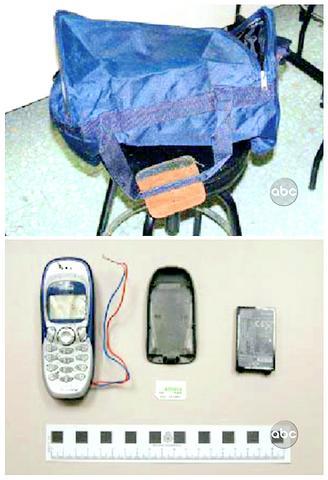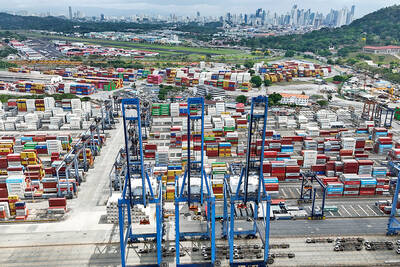A Spanish judge charged two more suspects in the Madrid rail bombings early yesterday as the incoming Socialist government, facing international pressure over plans to withdraw troops from Iraq, doubled its deployment to Afghanistan.
Shortly after the hearing ended, an investigator speaking on condition of anonymity said that another suspect had been arrested, but gave no details.
Judge Juan del Olmo charged Basel Ghayoun, a Syrian, with mass killings in the March 11 bombings that left at least 190 people dead. The judge also charged a Moroccan, Hamed Ahmidam, with collaborating with a terrorist organization.

PHOTO: REUTERS
At the same time, the judge released three suspects after questioning. Of the 22 people arrested, 14 have been charged and six have been released. In addition to the latest suspect arrested, another person was arrested on Friday but has not been publicly identified and has yet to appear in court.
Court officials said that two witnesses, including one who was wounded in the attack, had placed Ghayoun on one of the commuter trains that was bombed.
Hamed Ahmidam had lived in a rural house outside Madrid where investigators believe the attackers prepared the explosives and stuffed them into backpacks, court officials said.
Both of the accused claimed they were innocent, but acknowledged they knew some of the other suspects being held in connection with the attack, including prime suspect Jamal Zougam, court officials said.
The charges stop short of a formal indictment but suggest that the court has strong evidence against them. They can be jailed for up to two years while investigators gather more evidence.
Ahmidam's brother, Said Ahmidam, was released, as were Mohammed Almallah Dabas, a Spanish citizen of Syrian descent, and Fouad Almorabit, also from Morocco.
Spanish news agencies reported Monday that another bombing victim, a 49-year-old woman, had died in a Madrid hospital, bringing the death toll to 191. Hospital officials would not confirm the reports. More than 1,800 people were injured in the terrorist attack on four commuter trains during rush hour.
A Morocco-based terrorist cell with possible links to Osama bin Laden's al-Qaeda network and al-Qaeda itself are the main focus of suspicion in the bombings. Ten of the 14 suspects so far charged in connection with the bombings are Moroccan.
Investigators analyzed a videotape in which a man claiming to speak on behalf of al-Qaeda said the group carried out the Madrid attack in reprisal for Spain's backing of the US-led war in Iraq.
Three days after the bombings, Prime Minister Jose Maria Aznar's conservative government was surprisingly defeated in elections by the anti-war Socialists.
Prime Minister-elect Jose Luis Rodriguez Zapatero pledged to remove Spain's 1,300 soldiers from Iraq unless the UN takes charge of the occupation. Zapatero says both the war and occupation are illegal because they lack a UN mandate.
Zapatero's campaign manager, Jose Blanco, told Spanish National Radio on Monday that plans to withdraw troops from Iraq by June 30 remain in place unless the occupation gets a UN mandate.
Facing criticism from the US and other countries, an aide to Spain's incoming defense minister, Jose Bono, said on Monday the nation will double its military contingent in Afghanistan to 250 soldiers this summer.
That decision was made in consultation with outgoing Defense Minister Federico Trillo, said Bono's spokesman Jose Luis Fernandez.
Zapatero's party supports the Afghanistan occupation because it is sanctioned by the UN, and NATO is commanding the forces overseeing reconstruction after the ouster of the Taliban.
Chris Henderson, spokesman for the 6,500 NATO-led troops in Afghanistan, welcomed the news. NATO is expanding its presence in Afghanistan beyond the capital Kabul, but member countries have been slow to commit more troops.
"It's going to be critical we get additional resources, additional troops," Henderson said.
The Spanish radio station Cadena Ser and the newspaper ABC have reported that Moroccan authorities believe a Moroccan named Abdelkrim Mejjati, 36, may have been the on-the-ground organizer of the Madrid attacks. Both outlets quoted Moroccan intelligence sources as saying Mejjati was in Madrid three days before the bombings.
Moroccan authorities said that Mejjati was convicted in absentia after deadly bombings in Casablanca last year and is no longer believed to be in Morocco. Those bombings killed 33 people and 12 suicide bombers.
Moroccan authorities said it was unclear what role Mejjati played in the Madrid bombings.
"Mejjati is a big fish but his precise role is still uncertain," a senior official said.
Also Monday, the newspaper El Pais reported that police searching a rural house where terrorists allegedly assembled the train bombs have found the fingerprints of at least 10 people, including Moroccan prime suspect Zougam.
Radio station Onda Cero said over the weekend that police also found the fingerprints of Abderrahim Zbakh, another Moroccan leading suspect.
Investigators would not confirm the reports, which also said detonators and traces of dynamite were found in the house near Morata de Tajuna, 30km southeast of Madrid.
The attackers planted backpacks laden with explosives in four rush-hour commuter trains and apparently triggered them by mobile phone.
A mobile phone attached to an unexploded bomb was traced to a mobile-phone store owned by Zougam.
Both Zbakh and Zougam have been charged with mass murder. Court documents have linked Zougam to members of a Spanish al-Qaeda cell.
French private investigator Jean-Charles Brisard said last week that Abu Musab al-Zarqawi, a Jordanian linked to al-Qaeda and suspected of heading a terrorist network in Iraq, is now believed to have masterminded the Madrid bombings.
Brisard is an internationally known counterterrorism expert who has testified before the US Congress and represents some family members of victims of the Sept. 11, 2001, terror attacks on the US.

THE TRAGEDY OF PUNCH: Footage of the seven-month-old Japanese macaque has gone viral online after he was rejected by his mother and formed a bond with a soft toy A baby monkey in Japan has captured hearts around the world after videos of him being bullied by other monkeys and rejected by his mother went viral last week. Punch, a Japanese macaque, was born in July last year at Ichikawa City Zoo. He has drawn international attention after zookeepers gave him a stuffed orangutan toy after he was abandoned by his mother. Without maternal guidance to help him integrate, Punch has turned to the toy for comfort. He has been filmed multiple times being dragged and chased by older Japanese macaques inside the enclosure. Early clips showed him wandering alone with

Australian Prime Minister Anthony Albanese yesterday said he did not take his security for granted, after he was evacuated from his residence for several hours following a bomb threat sent to a Chinese dance group. Albanese was evacuated from his Canberra residence late on Tuesday following the threat, and returned a few hours later after nothing suspicious was found. The bomb scare was among several e-mails threatening Albanese sent to a representative of Shen Yun, a classical Chinese dance troupe banned in China that is due to perform in Australia this month, a spokesperson for the group said in a statement. The e-mail

TENSIONS: The march went ahead without clashes, but arrests were still possible as police investigate suspects behind Nazi salutes, racist slurs and homophobic insults Thousands of people on Saturday marched in southeastern France under heavy security in tribute to a far-right activist whose killing, blamed on the hard left, has put the country on edge. The crowd — many wearing black and some covering their lower faces with masks — marched through the city of Lyon carrying flowers and placards bearing pictures of Quentin Deranque and the words: “justice for Quentin” and “the extreme left kills.” The 23-year-old died from head injuries following clashes between radical left and far-right supporters on the sidelines of a demonstration against a politician from the left-wing France Unbowed

‘OCCUPATION’: Hong Kong said it had lodged ‘stern protests’ with Panama’s consulate, and would ‘staunchly support’ the rights and interests of Hong Kong companies Panamanian President Jose Raul Mulino on Monday ordered the temporary occupation of two ports run by a unit of CK Hutchison Holdings Ltd following the Supreme Court’s ruling against the firm’s concession, escalating a dispute that has become a proxy battle between the US and China in Latin America. Mulino said in a speech that the administration and operation of the two ports on the strategic Panama Canal is to revert to the country’s National Maritime Authority to ensure their uninterrupted, safe and efficient operation. The occupation covers movable equipment at the ports and does not mean a definitive loss of